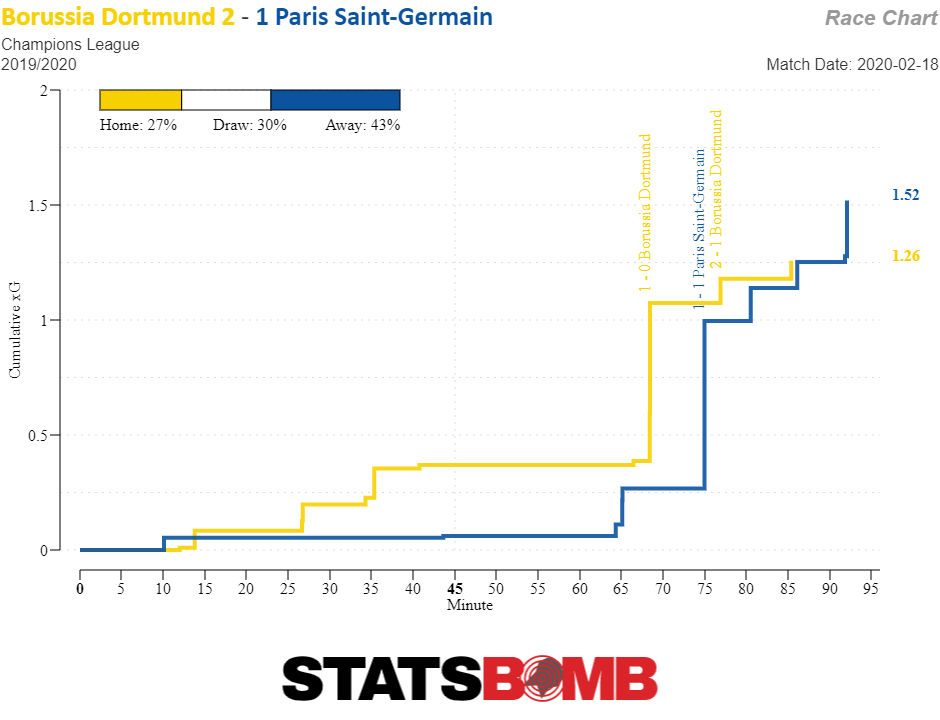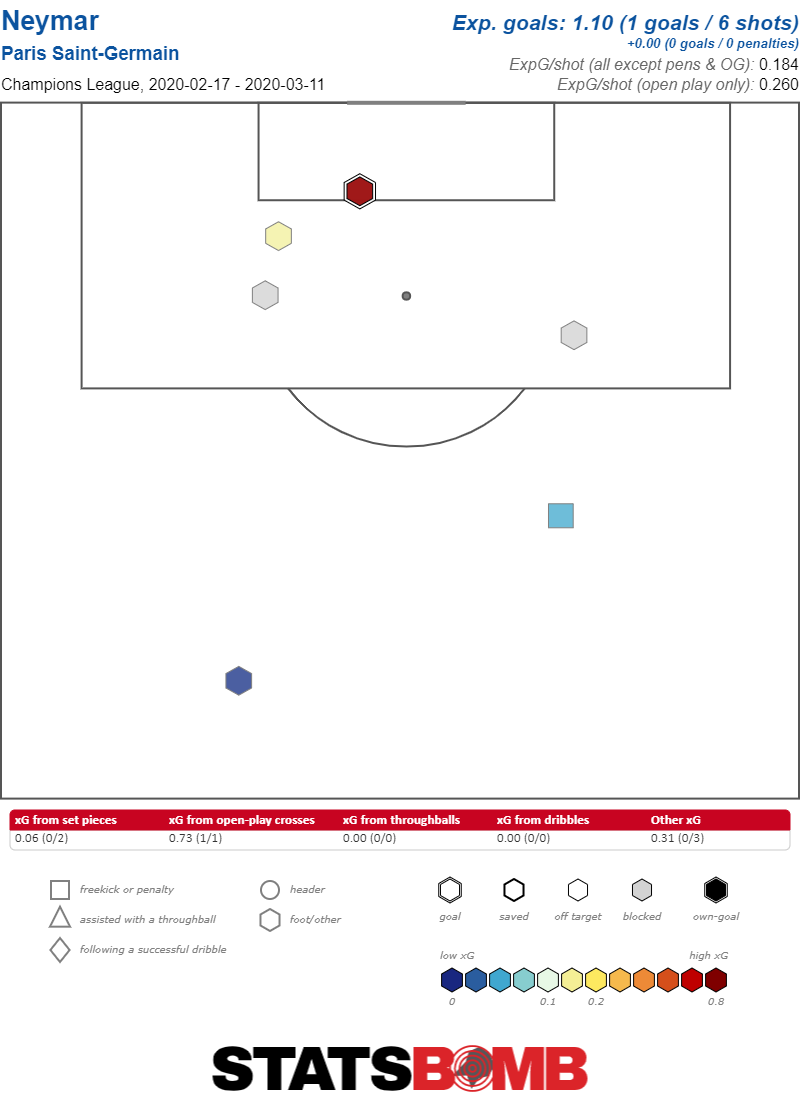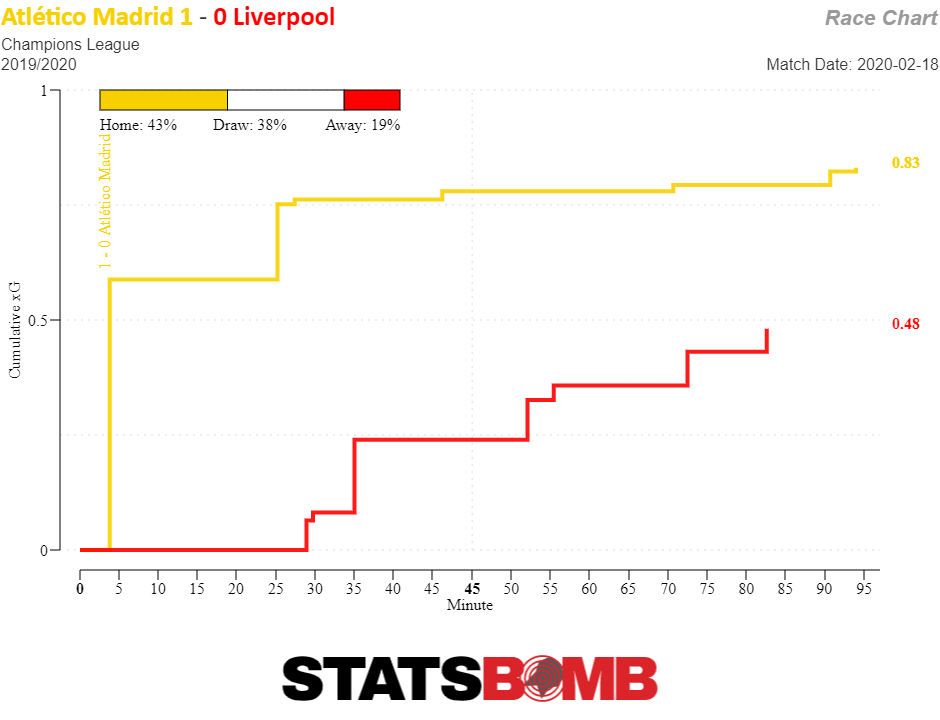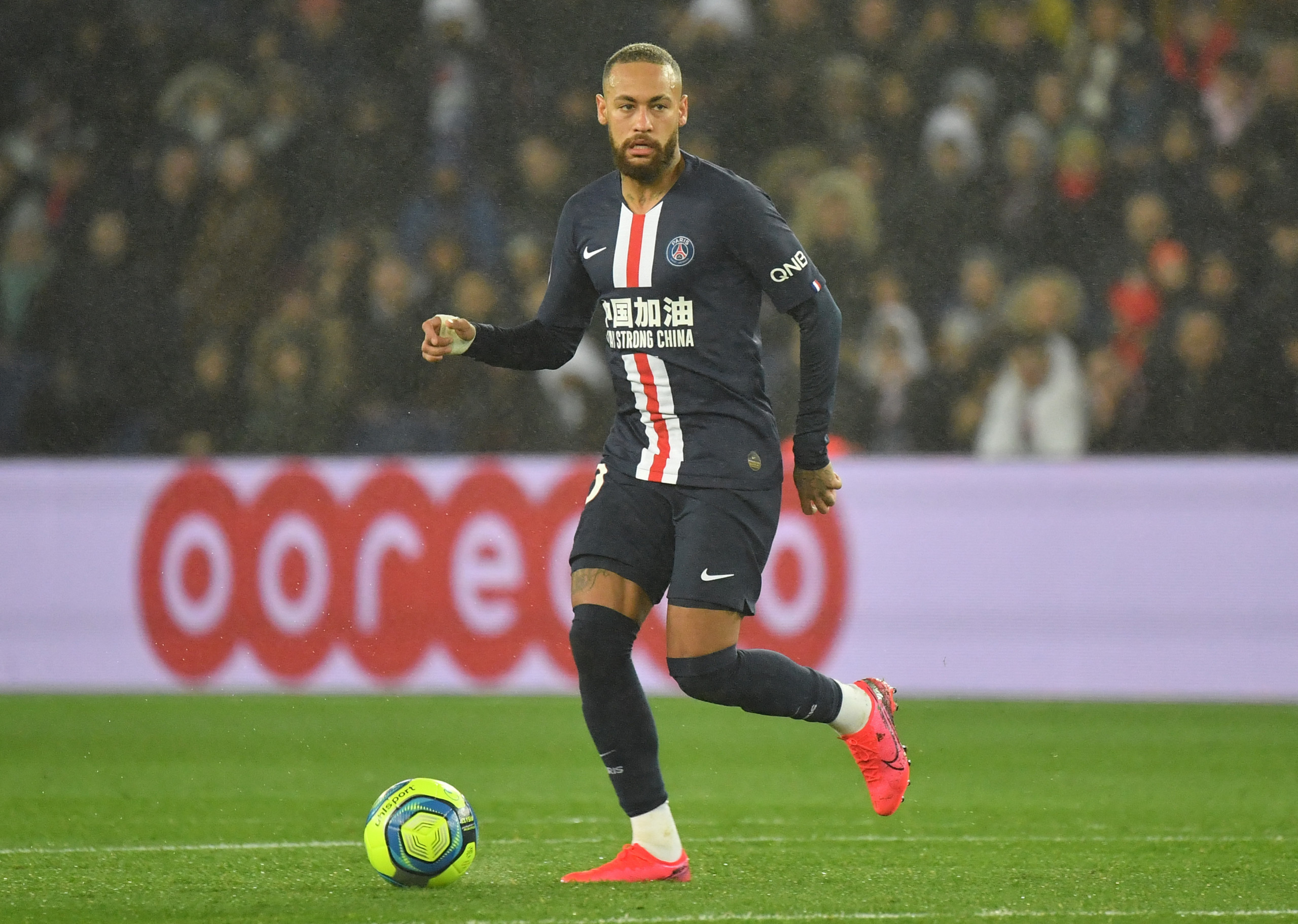Two clubs, both alike in deficits, In stricken Europe, where we lay our scene. The main question going into Wednesday’s Champions League matches is whether two of Europe’s best teams can overturn single-goal deficits over 90 minutes at home, to which the obvious answer is sure, they could. A historic comeback doesn’t stand between the two hosts and the quarterfinals; it’s not even clear these sides are underdogs. Still, there’s work to be done.
Paris Saint-Germain vs Borussia Dortmund
Of the home sides, Paris Saint-Germain has the advantage of an away goal. Pursuing the goal they need therefore comes with fewer risks. This is for the best insofar as PSG aren’t notorious for picking their spots. Being able to secure an aggregate tie with a 2-1 win means things needn’t get frantic.  One can easily overstate the extent of PSG’s European struggles. Their extremely banterous losses often get conflated with normal, disappointing results, like the first leg against Dortmund. It is true that Thomas Tuchel’s tactics require PSG to dominate the ball, which is more easily achieved in Ligue 1 than against a Dortmund side that values slow, defensive possession. Still, PSG generated 1.52 expected goals to Dortmund’s 1.26 without a convincing solution to this longstanding problem. It was a match where each side scored their one, big chance from a central position and Dortmund converted a low-probability shot from outside the box. It happens. The first leg was a reminder of PSG’s known weaknesses but not an argument that they were terminal flaws.
One can easily overstate the extent of PSG’s European struggles. Their extremely banterous losses often get conflated with normal, disappointing results, like the first leg against Dortmund. It is true that Thomas Tuchel’s tactics require PSG to dominate the ball, which is more easily achieved in Ligue 1 than against a Dortmund side that values slow, defensive possession. Still, PSG generated 1.52 expected goals to Dortmund’s 1.26 without a convincing solution to this longstanding problem. It was a match where each side scored their one, big chance from a central position and Dortmund converted a low-probability shot from outside the box. It happens. The first leg was a reminder of PSG’s known weaknesses but not an argument that they were terminal flaws.  All of that may be a roundabout way of saying that Neymar is very, very good. He accounted for six of PSG’s ten shots and 1.1 expected goals. This hasn’t always happened for him at PSG, but a player who can carry a team like that can solve a lot of tactical problems. Falling back on the individual talent of Neymar — or Kylian Mbappé, who had a quiet first leg, except for his one moment of genius — when Tuchel’s Rube Goldbergian possession machine isn’t working may be necessary with Marco Verratti suspended. Dortmund, as you may have heard, also have some excellent forwards. I’m not here to tell you that Erling Håland will double his expected goals forever, but I’m also not going to provide assurances this won’t continue in Paris. There’s also the not-insignificant matter of his being very good even if we ignore finishing luck. Jadon Sancho: also good. While Dortmund haven’t shown much ability to keep PSG out of their penalty area, they can mitigate this issue with possession wingbacks and break through Håland and Sancho in search of an away goal. (Marco Reus is out injured.) Dortmund’s path to the next round, then, looks a lot like the first leg; playing PSG close and then getting some finishing luck may not be the likeliest outcome, but it’s a valid approach in a cup competition. PSG are probably the better side in this tie, but Dortmund have the tools to frustrate them.
All of that may be a roundabout way of saying that Neymar is very, very good. He accounted for six of PSG’s ten shots and 1.1 expected goals. This hasn’t always happened for him at PSG, but a player who can carry a team like that can solve a lot of tactical problems. Falling back on the individual talent of Neymar — or Kylian Mbappé, who had a quiet first leg, except for his one moment of genius — when Tuchel’s Rube Goldbergian possession machine isn’t working may be necessary with Marco Verratti suspended. Dortmund, as you may have heard, also have some excellent forwards. I’m not here to tell you that Erling Håland will double his expected goals forever, but I’m also not going to provide assurances this won’t continue in Paris. There’s also the not-insignificant matter of his being very good even if we ignore finishing luck. Jadon Sancho: also good. While Dortmund haven’t shown much ability to keep PSG out of their penalty area, they can mitigate this issue with possession wingbacks and break through Håland and Sancho in search of an away goal. (Marco Reus is out injured.) Dortmund’s path to the next round, then, looks a lot like the first leg; playing PSG close and then getting some finishing luck may not be the likeliest outcome, but it’s a valid approach in a cup competition. PSG are probably the better side in this tie, but Dortmund have the tools to frustrate them.
Liverpool vs Atlético Madrid
Liverpool, unlike PSG, are clearly better than an Atleti side that is good but not Diego Simeone’s finest. They’re the defending champions and for all but the Bayern-curious, probably still the best side in Europe. Peak Liverpool should advance. But shit happens, which isn’t all that different from saying Atleti happens. There’s also the question of whether Peak Liverpool will show up on Wednesday.  Peak Liverpool did not show up in Madrid. Despite trailing from the fourth minute, Jurgen Klopp’s side didn’t get a shot until the 29th minute and were held shotless after the 83rd minute. Of the seven shots generated in the middle half-ish of the match, just three were in the box and none were particularly threatening. All season long, Liverpool have been able to shift into a higher gear and produce a flurry of good shots when necessary. That did not happen in the first leg. Atleti deserves a lot of credit for Liverpool’s uncharacteristic first-leg performance. No side’s average defensive action was closer to their own goal than Atleti’s during the Round of 16 first legs. Theirs was a rearguard action, but an organized one. Every time they moved back or rotated, they had a clear structure. This hallmark of a Simeone side is quite rare. Most sides defending this deep end up conceding good shots because they’re not very good and run out of ideas as they retreat, leaving opponents with the ball near their goal. Atleti, on the other hand, held Liverpool to the second-longest average shot length of the first legs. Only they shot from further away; it was that kind of match, which is to say it was their kind of match. At the same time, Atleti’s defensive parsimony alone cannot account for Liverpool’s attacking struggles in the first leg. Talented teams with 71 per cent possession don’t usually confine their limited shooting to the middle 50 minutes of a match. Shot quality is important but so too is shooting. Something went very wrong in the first leg, but Liverpool’s performances over the subsequent weeks, while not their best, didn’t suggest this was anything but a one-off. How much can be solved by Liverpool just playing, well, better? It’s entirely possible they could eke out a 1-0 win on the strength of finishing luck and just a bit more attacking competence. This is for the best as Liverpool have to manage the risk of conceding an away goal. At the same time, some tactical tweaks might help. Atleti’s pressing in the first leg was focused on the areas frequented by Liverpool’s fullbacks, who double as de facto creative midfielders. While this problem could be solved by counting on the excellence of Trent Alexander-Arnold and Andy Robertson to win out, as it usually does, a touch more creativity and directness from midfield might come in handy and give Simeone’s side something else to think about. Atleti’s approach for the second leg seems clear: defend and try to snaffle a goal. It worked in the first leg and has worked for Simeone sides in the past. Good teams get eliminated in cup ties. It happens. Another way of formulating the central question in Wednesday’s ties, then, is whether football can happen to a good team twice in a row. The only answer is yes. With respect to spreadsheets, that’s why we watch the games.
Peak Liverpool did not show up in Madrid. Despite trailing from the fourth minute, Jurgen Klopp’s side didn’t get a shot until the 29th minute and were held shotless after the 83rd minute. Of the seven shots generated in the middle half-ish of the match, just three were in the box and none were particularly threatening. All season long, Liverpool have been able to shift into a higher gear and produce a flurry of good shots when necessary. That did not happen in the first leg. Atleti deserves a lot of credit for Liverpool’s uncharacteristic first-leg performance. No side’s average defensive action was closer to their own goal than Atleti’s during the Round of 16 first legs. Theirs was a rearguard action, but an organized one. Every time they moved back or rotated, they had a clear structure. This hallmark of a Simeone side is quite rare. Most sides defending this deep end up conceding good shots because they’re not very good and run out of ideas as they retreat, leaving opponents with the ball near their goal. Atleti, on the other hand, held Liverpool to the second-longest average shot length of the first legs. Only they shot from further away; it was that kind of match, which is to say it was their kind of match. At the same time, Atleti’s defensive parsimony alone cannot account for Liverpool’s attacking struggles in the first leg. Talented teams with 71 per cent possession don’t usually confine their limited shooting to the middle 50 minutes of a match. Shot quality is important but so too is shooting. Something went very wrong in the first leg, but Liverpool’s performances over the subsequent weeks, while not their best, didn’t suggest this was anything but a one-off. How much can be solved by Liverpool just playing, well, better? It’s entirely possible they could eke out a 1-0 win on the strength of finishing luck and just a bit more attacking competence. This is for the best as Liverpool have to manage the risk of conceding an away goal. At the same time, some tactical tweaks might help. Atleti’s pressing in the first leg was focused on the areas frequented by Liverpool’s fullbacks, who double as de facto creative midfielders. While this problem could be solved by counting on the excellence of Trent Alexander-Arnold and Andy Robertson to win out, as it usually does, a touch more creativity and directness from midfield might come in handy and give Simeone’s side something else to think about. Atleti’s approach for the second leg seems clear: defend and try to snaffle a goal. It worked in the first leg and has worked for Simeone sides in the past. Good teams get eliminated in cup ties. It happens. Another way of formulating the central question in Wednesday’s ties, then, is whether football can happen to a good team twice in a row. The only answer is yes. With respect to spreadsheets, that’s why we watch the games.
